Tritium has just been named on Fast Company’s 2019 list of the World’s Most Innovative Companies.
YOU’RE INVITED!
Tritium will be exhibiting at SXSW in Austin, TX. You are invited to visit Tritium’s BOOTH #1736 and talk to us about DC fast charging and High Power Charging (HPC) infrastructure for electric vehicles. We offer solutions for charging networks, utilities, fleet operators and more.
5 REASONS TO VISIT OUR STAND
1. Tritium has one of the largest deployments of EV fast chargers in the US. Find out why you might not have heard of us!
2. Tritium has 20 years experience designing the most efficient, smallest, highest reliability fast chargers.
3. See our range of products from ”Level 3” 50 kW chargers up to the fastest chargers in the world, 350 kW.
4. Find out about the largest fast charging network in the world, and how it is being powered by Tritium.
5. We have just been named in FAST COMPANY’S 2019 LIST OF THE WORLD’S MOST INNOVATIVE COMPANIES!
DON’T MISS TRITIUM’S PRESENTATION
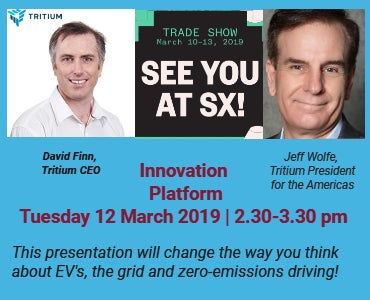
Don’t miss out! David Finn, CEO and co-founder of Tritium, and Jeff Wolfe, President for the Americas region, will deliver a presentation which will dive into the next stage in the evolution of DC fast and ultra-fast charging technology.
MAKE CONTACT
Want to make contact , or reserve a 30-minute sit down (space limited, reserve now) with one of our team members? Let us know who you are and how we can help. Email [email protected]
ABOUT SxSW
South by Southwest® (SXSW®) Conference & Festivals is about dynamic, forward-thinking businesses and organizations that are changing the game and looking to share their stories.
ABOUT TRITIUM
At Tritium, we want everyone to enjoy clean, healthy and convenient cities. Our company is committed to energy freedom and we are continually developing technologies and products that will enable the world’s EV owners to maximize the benefits of their vehicles. As both a convenient mode of transport and a mobile energy asset. By designing a range of products which support the uptake of EV’s, Tritium’s aim is to lower the barriers that can prevent transition to e-mobility.
HOW CAN WE HELP?
Contact us by emailing [email protected]
YOU’RE INVITED!
Tritium will be exhibiting at Advanced Clean Transportation Expo. You are invited to visit Tritium’s BOOTH #1712 and talk to us about DC fast charging and High Power Charging (HPC) infrastructure for electric vehicles. We offer solutions for charging networks, utilities, fleet operators and more.
5 REASONS TO VISIT OUR STAND
1. Tritium has one of the largest deployments of EV fast chargers in the US. Find out why you might not have heard of us!
2. Tritium has 20 years experience designing the most efficient, smallest, highest reliability fast chargers.
3. See our range of products from ”Level 3” 50 kW chargers up to the fastest chargers in the world, 350 kW.
4. Find out about the largest fast charging network in the world, and how it is being powered by Tritium.
5. We have just been named in FAST COMPANY’S 2019 LIST OF THE WORLD’S MOST INNOVATIVE COMPANIES!
DON’T MISS OUT- TRITIUM’S CEO WILL BE SPEAKING AT ACT
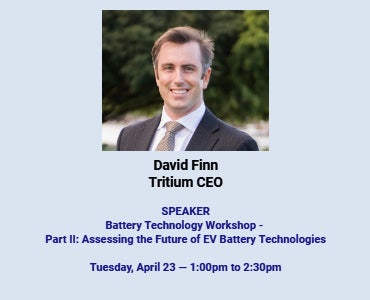
MAKE CONTACT
Want to make contact, or reserve a 30-minute sit down (space limited, reserve now) with one of our team members? Let us know who you are and how we can help. Email [email protected]
ABOUT ACT
The largest advanced transportation technology and clean fleet event.
ABOUT TRITIUM
At Tritium, we want everyone to enjoy clean, healthy and convenient cities. Our company is committed to energy freedom and we are continually developing technologies and products that will enable the world’s EV owners to maximize the benefits of their vehicles. As both a convenient mode of transport and a mobile energy asset. By designing a range of products which support the uptake of EV’s, Tritium’s aim is to lower the barriers that can prevent transition to e-mobility.
HOW CAN WE HELP?
Contact us by emailing [email protected]
Tritium is honoured to have been named to FAST COMPANY‘s Most Innovative Companies list!
We’ve been named in the energy category for “speeding up EV charging, adding up to 60 miles of range in just five minutes”
See the list :
THE WORD’S MOST INNOVATIVE COMPANIES: ENERGY SECTOR
YOU’RE INVITED!
You are invited to visit Tritium’s booth #2048 and talk to us about DC fast charging and High Power Charging (HPC) infrastructure for electric vehicles. We offer solutions for charging networks, utilities, fleet operators and more.
5 REASONS TO VISIT OUR STAND
1. Tritium has one of the largest deployments of EV fast chargers in the US. Find out why you might not have heard of us!
2. Tritium has 20 years experience designing the most efficient, smallest, highest reliability fast chargers.
3. See our range of products from ”Level 3” 50 kW chargers up to the fastest chargers in the world, 350 kW.
4. Find out about the largest fast charging network in the world, and how it is being powered by Tritium.
5. We come from Australia, and you’ll like us!
MAKE CONTACT
Want to make contact before the Conference, or reserve a 30-minute sit down (space limited, reserve now) with one of our team members? Let us know who you are and how we can help. Email [email protected]
ABOUT DISTRIBUTECH
The energy exchange is transforming, and we serve as the central nervous system. An 11-track summit, knowledge hubs, Initiate! startup & student ecosystem, an exhibition floor with 500+ companies, networking and matchmaking.
ABOUT TRITIUM
At Tritium, we want everyone to enjoy clean, healthy and convenient cities. Our company is committed to energy freedom and we are continually developing technologies and products that will enable the world’s EV owners to maximize the benefits of their vehicles. As both a convenient mode of transport and a mobile energy asset. By designing a range of products which support the uptake of EV’s, Tritium’s aim is to lower the barriers that can prevent transition to e-mobility.
HOW CAN WE HELP?
Contact us by emailing [email protected]
• Tritium won tender from EDF Luminus, operator of Belgium phase of UNIT-E fast-charging network
• Official launch of Belgium section 11 December 2017
Brisbane, Australia 12 December 2017: Tritium, the Australian-based technology company and leading international specialist in developing infrastructure solutions for the electric vehicle (EV) market, has supplied all the fast chargers for the Belgium stage of the European Union’s UNIT-E fast-charging network. The Belgium phase of the project, led by major energy supplier, EDF Luminus, has seen the installation of 25 Tritium Veefil-RT 50kW fast chargers across the country, completing a fast charging corridor connecting France, Belgium and Netherlands.
All the Veefil-RT chargers are positioned along the Belgium motorway system, linking the country’s major cities. The Belgium section of the network was officially launched on 11 December 2017, by the Vice President of the Flemish Government and Minister of Finance and Energy, Bart Tommelein.
“We have liaised closely with EDF Luminus to tailor our world-class technology to meet their particular specifications,” xplains Tritium’s European Sales Manager, Manuel Fernandes. “The Veefil-RTs on the UNIT-3 network will be easy to use and accessible to all drivers – they support DC CHAdeMO & CCS (Combined Charging System) and AC Modes-3 Type-2 standards, can charge two vehicles at the same time and accept all charging passes. Drivers can expect to charge 80 per cent of their battery in just 30 minutes.
*About UNIT-E
The UNIT-E project is co-financed by the European Union through the Connecting Europe Facility programme, established to support the construction and modernisation of transport infrastructure across the EU. It set out to identify and fill gaps in the existing European charging network to support drivers to make seamless electric journeys. The project’s aim is to make it feasible for electric car drivers to travel from Scotland to Genoa in Italy or Brussels in Belgium, using public charging to support their journeys.
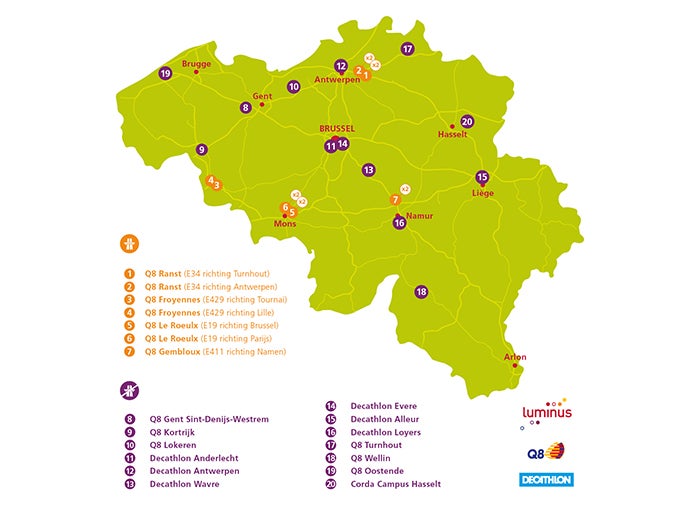
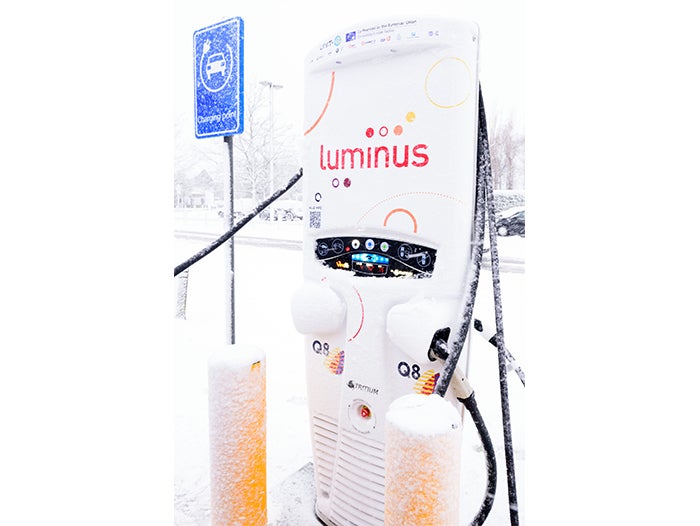
The Veefil® DC Range of Fast Chargers
In May 2013, Tritium launched an award‐winning, 50 kW DC fast charger for electric vehicles – the Veefil‐RT ‐ which is already recognised internationally as being the most technologically advanced in its class. Tritium is the only Australian company to design and manufacture EV charging stations and its Veefil units are now being installed globally on major charging networks and fast‐charging highways. In October 2016 the company launched three new products, creating a range of Veefil units that give customers increased options to provide a charging service for vehicles that are privately owned and those employed in the business sector:
New Products: Veefil‐UT 50kW DC fast charger; Veefil‐WP 12kW DC fast charger; Veefil‐RT 22kW DC fast charger.
Why Veefil® technology is the most technologically advanced in its class
The Veefil range comprises the world’s most technologically‐advanced fast charger for all EVs, supporting CHAdeMO & SAE‐Combo standards. All the products share a number of unique features:
About EDF Luminus
EDF Luminus, leading challenger in the Belgian energy market, is a major electricity producer and supplier of energy and energy services. EDF Luminus is number 1 in onshore wind and hydroelectric power in Belgium. The company also plays a key role in the country’s security of supply by operating several gas-fired power plants that balance the fluctuating nature of wind and solar power. With an installed capacity of 1,984 MW as of November 1, 2017, EDF Luminus represents approximately 10% of the total installed capacity of the country. Under its Luminus brand, the company sells electricity, gas and premium energy services to nearly 2 million residential and
business customers, representing a market share of around 20%. EDF Luminus invests to face the energy challenges of tomorrow: the company is committed to delivering innovative energy efficiency solutions to its customers and is pursuing its developments in renewable energy. EDF Luminus’ vision is based on its involvement to best satisfy its customers and to provide its 2,000 employees with attractive career opportunities. For the 5th year in a row, the company ranks among the top 59 employers in Belgium. EDF Luminus benefits from its strong local roots and from the expertise of the EDF Group, one of the major players in the global energy sector. For more information, please visit WWW.EDFLUMINUS.BE
November 09, 2018, Brisbane, Australia – A $1.5 million gift from the Trevor and Judith St Baker Family Foundation will help electrify green technology research at The University of Queensland (UQ).
The gift will establish a visiting fellowship that will bring a world-leading expert to UQ to advance environmentally friendly transport options – known as ‘e-mobility’.
UQ Vice-Chancellor and President Professor Peter Høj said the gift would accelerate Brisbane’s position as a hub of electric vehicle charging technology and manufacturing.
“Thanks to the generosity of Trevor and Judith St Baker, UQ will continue to develop promising green energy technology here in Brisbane,” he said.
“The visiting fellow will contribute to the global research initiative Rapid Switch Project, finding solutions to help reduce global reliance on carbon-based fuels and products.
“This partnership exemplifies the cross-disciplinary nature of the green technology research that UQ is involved in alongside our partners in education, industry and philanthropy.”
Transport and Main Roads Minister Mark Bailey said green energy investment was electrifying the Queensland economy.
“As a result of investment in green energy Brisbane has become a global leader in e-mobility technology and manufacturing,” Mr Bailey said.
“Brisbane-based e-mobility firm Tritium currently produces the world’s smallest DC fast charger for electric vehicles and has captured eight per cent of the global electric vehicle charger market.
“Investment in green technology – like this gift from the St Bakers – will help Brisbane develop further into a thriving centre for sustainable energy research, development and production.”
Mr St Baker is renowned for his investments in innovative technologies that are environmentally sustainable and economically beneficial.
Since founding one of Australia’s largest energy retail and generation companies, ERM Power Limited from an energy consulting practice and family-owned enterprise, Mr St Baker has gone on to fund innovative companies that are moulding the future of power in Australia.
Mr St Baker said he believed Australia’s transition to a sustainable low-emission electronically driven energy industry required a wider range of research, development and technological leadership.
“The electrification of the transport sector has the potential to radically change how people procure and manage energy resources for all their needs.”
“We want to continue to ensure the best and brightest minds in Australia are given optimal opportunity to be part of the global knowledge economy in the transport sector, and to shape a sustainable future.”
A long-term supporter of UQ, in 2017 Mr St Baker became a board member for UQ’s Not If, When philanthropic campaign which aims to raise $500m for priority projects by the end of 2020.
“My wife Judith and I are proud to support an initiative that will promote international collaboration and growth in a sustainable energy industry in Australia.” he said.
The Tritium e-Mobility Visiting Fellowship will be named after Tritium, a Brisbane-based e-mobility company and manufacturer of electric vehicle chargers, of which Mr St Baker is the chairman.
Tritium employs more than 250 staff and exports to 26 countries.
Tritium’s manufacturing has remained in Brisbane providing opportunities for a wide-range of professionals developing technologies for the uptake of e-mobility.
Talking Business is an inflight entertainment radio program on Qantas, hosted by Alan Kohler. In the month of November 2018, Qantas radio will feature an interview with Paul Sernia, Chief Product Officer and co-founder of Tritium. Listen to the interview by clicking on the play button below.
https://omny.fm/shows/talking-business/paul-sernia-chief-product-officer-and-a-co-founder#sharing
New Research Finds Utilities Need to Prepare Their Networks for Mass EV Adoption Now to Avoid Unpredictable Grids
BRISBANE, AUSTRALIA, November 21, 2018 – The growing demand for energy driven from the uptake of electric vehicles (EVs) could lead to greater unpredictability in electrical grids unless utilities take a proactive approach to planning their future networks, according to a joint study from L.E.K. Consulting, a global management consulting firm, and Australian EV charging infrastructure company Tritium.
The study highlights statistics around sales of EVs which show that there is a ‘clustering’ effect, where some suburbs, streets, and locations have a higher proportion of EV ownership[1]. This has the potential to overload local electricity infrastructure, especially the feeder lines (i.e. “poles and wires” down a street).
“There are significant opportunities for network owners, operators and energy retailers as EVs are one of the few growth drivers for many developed energy markets, and also enable the opportunity for utilities to build closer customer relationships,” says Natasha Santha, principal at L.E.K. Consulting. “But utilities need to be proactive in planning for a future scenario of significant EV adoption, especially in a world where spending capex on additional infrastructure at the cost of the consumer is no longer a palatable response”.
““The real challenge for utilities is managing the peak demand increase and greater unpredictability that comes with greater EV adoption,” says Santha. “EV charging has an element of randomness that needs to be managed, this can stress local infrastructure and heighten the need for increased network investment”. “The good news is that we have time to prepare in Australia. Given the expected pace of adoption, and time it will take to turn over the car parc, grid owners have sufficient time to prepare for the change.”
While EV uptake in Australia is still in its infancy, it is growing, and networks need to prepare for this now. As the need for the deployment of public fast chargers is required in Australia, utilities will need to be ready to turn around new connections quickly.”
Among other findings, the study found that:
· The expected increase in overall energy demand is relatively modest in the short to medium term. In 2017, the estimated electricity demand from all EVs was 54 TWh equating to just 0.3% of global electricity demand. With a predicted 125m EVs on the road in 2030, (for simplicity, assuming a similar level of battery energy efficiency as today), the overall EV share of energy demand would increase to only 6.3%. .
· However, owning an EV will increase a household’s electricity consumption by about 50%[2]. If multiple houses on a single street decide to charge simultaneously, there may be insufficient capacity in the feeder lines to deliver the required level of power. For example, assuming utilities make no changes to their infrastructure and EV charging is unmanaged, and EVs owners mostly charge at the end of the traditional workday when they return home, overlaying the impact of EV charging on a local network (with 50% EV adoption) would drive peak demand up by c.30%.
· As the demand for EVs increases, there will be a growing requirement for charging infrastructure. The IEA estimates that by 2030 the number of charging stations required will exceed 130 million units, which is close to 30 times the current installed box.
· Further, the study found the development of high-power charging infrastructure may have a more manageable initial impact for network operators. High power chargers, up to 350kw each, are typically installed in a park or group of chargers. While these groups of high-power chargers equate to very large (1MW+) connections, the charger owners will deploy the appropriate infrastructure adjacent to the charging equipment at the time of installation.
The study outlined five measures utilities should consider, both to stabilise future grid behaviour and ensure the rise of electric vehicles maintains its pace:
1. Design tariffs and demand response programs: Utilities need to begin preparing incentive structures to manage residential chargers, such as time of use EV tariffs that can shift customer charging behaviour alleviating local feeder stress. They could glean lessons from South Australian and Queensland networks, which are trialling new tariffs to encourage households with electric hot water systems to heat them in off-peak periods.
2. Utilise smart software: Managed charging, uses software to schedule home charging throughout the night avoiding the risk of EV owners all plugging in during the evening peak, using lessons gleaned from such measures as air conditioning incentive programs.
3. Improve grid information: Provide clear and detailed information publicly to businesses and entrepreneurs looking to invest in and install public charging infrastructure. For example, PG&E a Californian utility has created an interactive mapping tool for network capacity highlighting the locations on their network where existing equipment has the capacity and is ready to be utilised for EV charging[3].
4. Assess adjacent opportunities from charging infrastructure: Utilities should begin to explore if there are other opportunities that arise from the deployment of charging infrastructure, such as stationary battery storage, to reduce grid augmentation costs and enable charger deployment in areas of the network that would otherwise be prohibitive.
5. Trial, test, and work with charging manufacturers: Collaboration and joint research will enable utilities to be at the forefront of emerging vehicle, charging, and grid integration technologies.
“Across the world we’re beginning to see measures that will only further foster the uptake of EVs such as IN MADRID, WHERE PETROL AND DIESEL-FUELLED CARS WILL BE BANNED from driving through the city during the day and parking on the road in the city at any time from the end of November this year,” said David Finn, Chief Executive Officer and co-founder, Tritium. “Governments all over the world are seeing the benefits of an e-mobility future and utilities have a tremendous opportunity to drive growth in their businesses – but they have to be prepared for it and that means putting the right infrastructure in place to manage an increase in energy demand.”
You can download the full study HERE.
Get in touch with Tritium HERE
About L.E.K. Consulting
L.E.K. Consulting is a global management consulting firm that uses deep industry expertise and rigorous analysis to help business leaders achieve practical results with real impact. We are uncompromising in our approach to helping clients consistently make better decisions, deliver improved business performance, and create greater shareholder returns. The firm advises and supports global companies that are leaders in their industries — including the largest private and public-sector organizations, private equity firms and emerging entrepreneurial businesses. Founded in 1983, L.E.K. employs more than 1,400 professionals across the Americas, Asia-Pacific and Europe. For more information, go to WWW.LEK.COM.
About Tritium
Brisbane-based Tritium is a technology company specialising in the design and manufacture of DC fast-charging solutions for electric vehicles (EV). Established in 2001, to provide power-electronic systems and battery energy-storage applications, it has, since the launch of its first DC fast charger in 2014, become one of Australia’s fastest-growing companies. In just four years Tritium has developed into a leading global DC fast charging supplier, with installations in 26 countries, and it currently holds around 50% of the Norwegian market and around 15% of the wider European market for 50kW fast chargers. In 2016, the Queensland Government invested AU$2.5m in Tritium – the first company to receive investment under a Business Development Fund scheme established to encourage innovative business – and it invested a further AU$2.5m in 2018. Customers include Charge.net.nz, EDF Lumins, Fortum, Grønn Kontakt, IONITY, Proterra and Stromnetz. Tritium’s HQ and main manufacturing plant is in Brisbane, with additional sales and manufacturing facilities in its two key markets of Europe and the US. TRITIUM.COM.AU
[1] HTTP://WWW.NATURE.COM/ARTICLES/S41560-017-0074-Z
[2] Assumes average household using 5,700 kWh of electricity per year, and the average EV consumers c 3000 kWh electricity per year driving c. 15,000km per year
[3] Site information for electric vehicle Direct Current Fast Chargers, PG&E (HTTPS://WWW.PGE.COM/EN_US/ABOUT-PGE/ENVIRONMENT/WHAT-WE-ARE-DOING/ELECTRIC-PROGRAM-INVESTMENT-CHARGE/DIRECT-CURRENT-ELECTRIC-VEHICLE-FAST-CHARGERS.PAGE)
David Finn, CEO and co-founder, Tritium is pictured here in the middle at the NACS show with (L) Martin Gafinowitz, SVP, Transportation Technologies, Fortive and (R) Aaron Saak, President, Gilbarco Veeder-Root.
Tritium announces Gilbarco Veeder-Root makes minority investment in company to accelerate global electric vehicle infrastructure build out
· Tritium set to target fuel services and other key markets
· Partnership supports Tritium’s mission to achieve energy freedom
Brisbane, Australia – 9 October 2018 – Tritium Pty Ltd, the Australian DC electric vehicle charging infrastructure solutions specialists, has today announced that Gilbarco Veeder-Root, a Fortive Corporation (“Fortive”) (NYSE: FTV) business, has taken a minority investment in the company.
Since it launched its first DC fast charger in 2014, Tritium, based in Brisbane Australia, has become a major global supplier, and currently has installations in 26 countries around the world.
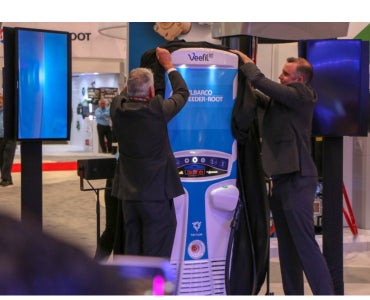
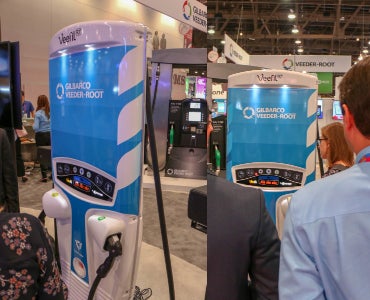
“Gilbarco Veeder-Root’s interest in Tritium further validates Tritium’s capabilities and technology expertise in the EV space,” said David Finn, Chief Executive Officer and founder, Tritium. “This investment also sends a strong message to the industry about the future of EV charging in the retail fueling and convenience market– it’s real, it’s happening and Tritium is at the forefront globally.”
Gilbarco Veeder-Root will sell all Tritium solutions, including Veefil-PK high power charging (HPC) systems, which are capable of a full charge of an EV in just five-to-ten minutes. These high power charging systems have unique and innovative liquid-cooled technology and a significantly smaller footprint than other HPCs on the market. The Tritium cooling system allows for less wear on internal parts to ensure optimal charger lifetime.
Martin Gafinowitz, Senior Vice President of Fortive, stated, “Our partnership with Tritium is the logical next step in our long history of evolving the Gilbarco Veeder-Root business portfolio to address progressive customer needs. This investment provides early and judicious entry into a market with a growing need for rapid charging, which is one of the top barriers to EV purchase”.
The investment will be enable Tritium to accelerate a number of strategic activities, including operational expansion in Europe and the USA to keep pace with a fast-growing market, with global sales tipped to increase by a third in 2018 compared with the previous year.¹
Other activities include expanding production capacity to meet increased demand for the company’s world-leading Veefil-PK Up To 475kW High Power Charging Systems, and new product research and development. Tritium will also look to expand into India, China and the wider Asian region in the medium turn, following its success in Europe and the USA.
Tritium has announced a number of customers across the globe in 2018, including a deal to supply its Veefil-PK HPC systems for the IONITY network. IONITY is a joint venture of the BMW Group, Daimler AG, Ford Motor Company and the Volkswagen Group including Audi and Porsche, and it plans to roll out 400 sites across Europe. Tritium’s deal is to supply high-power chargers to 100 of those sites across Germany, France, UK, Norway and Sweden.
The company also recently signed a deal to supply at least 40 Veefil RT-50kW DC fast chargers for the NRMA’s charging network rollout across the state of New South Wales in Australia, and a separate deal to supply 12 Veefil-RTs to NKM Mobilitas Ltd. (Mobiliti) in Hungary.
-ends-
[1] FROST & SULLIVAN: GLOBAL ELECTRIC VEHICLE MARKET OUTLOOK, 2018
ABOUT TRITIUM
Tritium is a fast-moving technology company specializing in the design and manufacture of DC fast-charging solutions for electric vehicles (EV). Established in Australia in 2001, to provide power-electronic systems and battery energy-storage applications, it launched its first DC fast charger (Veefil-RT) in 2014, since when it has become a leading global supplier, with installations in 26 countries. The US is one of Tritium’s major markets and it opened a manufacturing, R&D and sales facility in Torrance, California in 2017. Its products are Buy America compliant and Tritium’s Veefil-RT 50kW fast charger is currently installed on EV charging networks on major routes across the US. In Europe, Tritium holds around 50% of the Norwegian market and around 15% of the wider European market for 50kW rapid chargers. Customers include Charge.net.nz, EDF Lumins, Fortum, Grønn Kontakt, IONITY, Proterra and Stromnetz. Tritium’s headquarters and main manufacturing plant is in Australia and it has a further facility in Amsterdam, servicing the European market. For more information, please visit: WWW.TRITIUM.COM.AU
ABOUT GILBARCO VEEDER-ROOT
Gilbarco Veeder-Root is the worldwide technology leader for retail and commercial fueling operations offering the broadest range of integrated solutions from the forecourt to the convenience store and head office. For over 150 years, Gilbarco Veeder-Root has earned the trust of its customers by providing long-term partnership, uncompromising support, and proven reliability. Major product lines include fuel dispensers, point-of-sale systems, payment solutions, tank gauges, retail software development and integration and fleet management systems. For more information, please visit: WWW.GILBARCO.COM
ABOUT FORTIVE
Fortive is a diversified industrial growth company comprised of Professional Instrumentation and Industrial Technologies businesses that are recognized leaders in attractive markets. With 2017 revenues of $6.7 billion, Fortive’s well-known brands hold leading positions in field instrumentation, transportation, sensing, product realization, automation and specialty, and franchise distribution. Fortive is headquartered in Everett, Washington and employs a team of more than 26,000 research and development, manufacturing, sales, distribution, service and administrative employees in more than 50 countries around the world. With a culture rooted in continuous improvement, the core of our company’s operating model is the Fortive Business System. For more information, please visit: WWW.FORTIVE.COM.